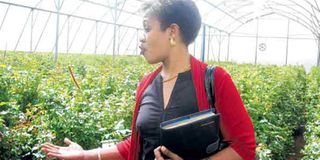Tanzania horticultural body awaits government move on tax cut plea

Taha executive director Jacquiline Mkindi during her visit to Mt Meru Flowers at Tengeru in Arumeru District. PHOTO | ZEPHANIA UBWANI
What you need to know:
- These include VAT on various agricultural inputs such as the cold storage facilities, plant protection substances and packaging materials, among others.
Arusha. Horticultural industry players are awaiting the government’s action to their proposals to reduce taxes.
These include VAT on various agricultural inputs such as the cold storage facilities, plant protection substances and packaging materials, among others.
The proposals were sent to the Taskforce on Tax Reform under the ministry of Finance and Planning in March this year by the Tanzania Horticultural Association (Taha), a lobby group based here.
“We have challenges on the taxation. They have implications on the horticulture industry,” said Taha Policy and Advocacy manager Kelvin Remen.
He told BusinessWeek that the horticultural stakeholders through Taha wanted reforms on some taxation laws and regulations that he said hindered the growth of the export oriented sub-sector.
Mr Remen hinted the Budget speech delivered in Parliament recently by the Finance minister and the Finance Bill 2018/19 that did not highlight their proposals, but are optimistic the government will act on their requests.
“The proposals submitted are solutions to most of the taxation challenges faced by the industry players which hinder the growth of horticulture sub sector due to unfavourable business environment,” he said.
Key among the reforms sought are with VAT Act, 2014 which, according to the official, now applied to several agricultural inputs and implements which were initially exempted.
Under it, items like biological control agents, storage, post-harvest and cooling facilities and equipment, packaging materials, refrigerated containers and peat moss agro-nets are taxed.
Taha wants the items on the list as well as spare parts for technologies like the greenhouse, irrigation system equipment such as dam liners and pipes also to be considered for exemption.
“These are important items and equipment in modern farming. Therefore, exempting them will make them affordable to farmers, reduce post-harvest losses and increase productivity in agriculture,” he said.
Also requested for scrapping is the import duty on packaging materials for horticulture produce.
They are currently charged import duty of 25 per cent and 10 per cent for printed and unprinted labels respectively.
Packaging materials are essential elements for preserving the quality of horticultural products such as flowers, vegetables and fruits in particular. Most of the quality packaging materials have to be imported.
Taha also want waiving of excise duty on plastic packaging materials for wrapping horticultural produce for export markets.
Currently they are charged excise duty for importation. “The excise duty on packaging materials makes Tanzanian produce more expensive and less competitive in the international markets,” said the horticulture Sub-Sector Fiscal Reform Proposals for Finance Act 2018/2019 sent to the ministry.
The Tanzania Revenue Authority (TRA) was accused of forcing the importers of horticultural inputs and equipment ‘’very high and unfair” taxes because of questionable tax assessments.
This, according to the report, has made the horticultural companies to incur significant losses during importation “to the extent that they have stopped importing even the very important agricultural inputs to support their farm operations”.
Taha is also up in arms over the fire levy charged on the horticultural farms and want the entities exempted from paying the fees. Presently they are charged Sh500,000 to Sh2 million per annum depending on the size of the farm.
Since fire and rescue services are located in towns and the farms away from the urban centres, horticultural farmers feel paying the levy was wastage of money since they cannot easily access the services during time of need.
Many farms have set their own fire control systems “and therefore charging them fire levy is an added cost of business”, the report added.
Horticultural production has grown steeply in the last five years, thanks to a favourable environment for investors and rising demand in the overseas markets.
According to Taha CEO Jacquiline Mkindi, the exports will hit $ 1.3 billion in three to five years’ time if the current production trend is sustained.




